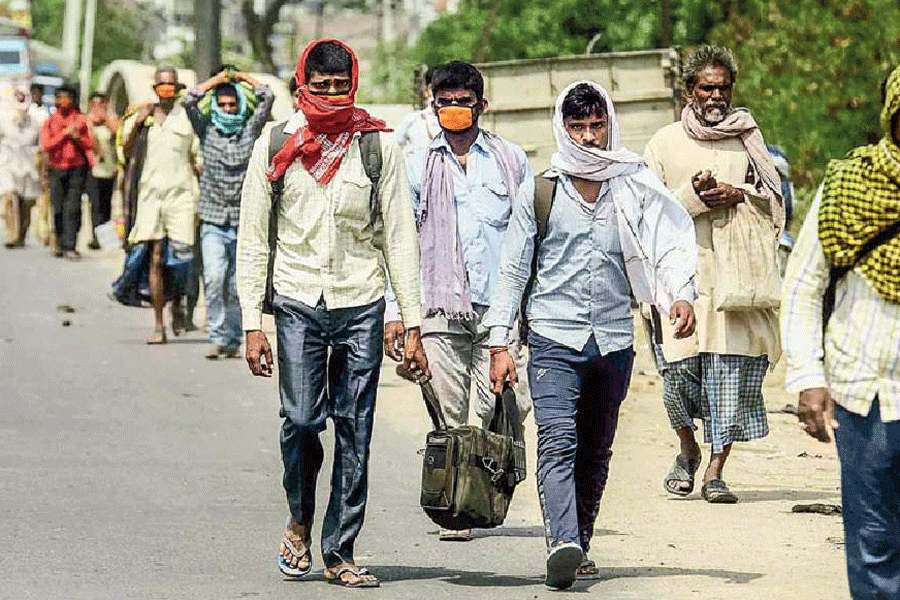Raj Kapoor crooning “Mera joota hai japani/ Ye patlun englishtani/ Sar pe laal topi roosi/ phir bhi dil hai Hindustani” resonates with most contemporary migrants in India and abroad. The quintessential Bollywood classic hints at both the socio-spatial and the sensory connotation of the idea of ‘home’. With globalisation and its accompanying advancements in technology, is the modern migrant affected by the conundrum called ‘home’? Do migrants nurture nostalgia? If so, how relevant is nostalgia to the modern migrant’s life?
Migration has always been a part of human existence. Factors influencing the magnitude of and the trends in migration are varied: economic, political, religious and ecological factors play an important part in it. Understanding the phenomenon of migration entails an analysis of cause-induced patterns.
Indian history has been largely shaped by various forms of migration — inward and outward. Indentured labour migration, Partition-induced migration and, in recent times, Covid-19-prompted migration are only some of the few cause-induced patterns of migration that have been relatively well-documented. The horrors of migration and the profound porosity of a migrant’s life were conspicuous when the nation was under a lockdown and thousands of daily wage migrants and students waited to return ‘home’. ‘Return’ suggested a promise of familiarity and comfort. It also highlighted the ambiguity of ‘home’ because even though people migrate with the hope of finding better prospects, the ‘place of origin’ is always a point of reference.
There are numerous migrants migrating from one place to another on a regular basis in search of sustainability and better prospects as well as an escape from their predicament. Migration due to marriage is equally significant. With advancements in Artificial Intelligence, globalisation and technology, migration theories appear to be in a transitional zone between geographical and imaginative reality. Ease in transportation and communication has diluted the idea of geographical distance. The modern migrant is no longer at odds with the stereotypical ‘place of origin’. Accessibility has replaced detachment. ‘Home’ is ubiquitous in a migrant’s life; yet it remains ambiguous in definition. Despite its strong structural connotation, it is simultaneously an imaginative— blurry — territory, which is an amalgamation of nostalgia, a sense of belonging, familiarity and optimism.
The pitfalls in understanding ‘home’ and the challenges faced by the modern migrant stem from the lack of a comprehensive framework to interpret the cause-induced pattern leading to migration. The migrant is displaced from not only a physical space but also a sensory space. The displacement gestates a syncretic space that oscillates between nostalgia and the contemporaneous. As the migrant ‘reflects’ and ‘restores’ in his/her new-found space, the sensory ‘home’ is restored with its foundation strongly in materiality.
The underpinning debate between longing and belonging questions the role of nostalgia in the modern migrant’s life. The word, nostalgia, partially derived from ‘algos’, has often been associated with suffering and loss. It has been held guilty of amplifying ‘loss’— the loss of a ‘home’, of friends and family, familiar sights, food and culture and so on. However, in contemporary times, nostalgia has evolved as a survival tool. In The Future of Nostalgia, Svetlana Boym suggests that the migrant’s sense of longing and the ability of critical thinking are not opposed to one another. Materiality and affective memories do not absolve one from compassion, judgement, and critical reflection. Nostalgia liaisons with the past and the present, promising a better future.
‘Home’ for the migrant is now replete with allusions to the past but foregrounded in the sense of ‘belonging’. Nostalgia is an agency of determination and grit. Through material agency, nostalgia for the modern migrant becomes a cardinal affect, underpinning the migrant’s hope for sustainability in a new space.
Chandrima Karmakar is Assistant Professor, Maharani Kasiswari College, Calcutta










